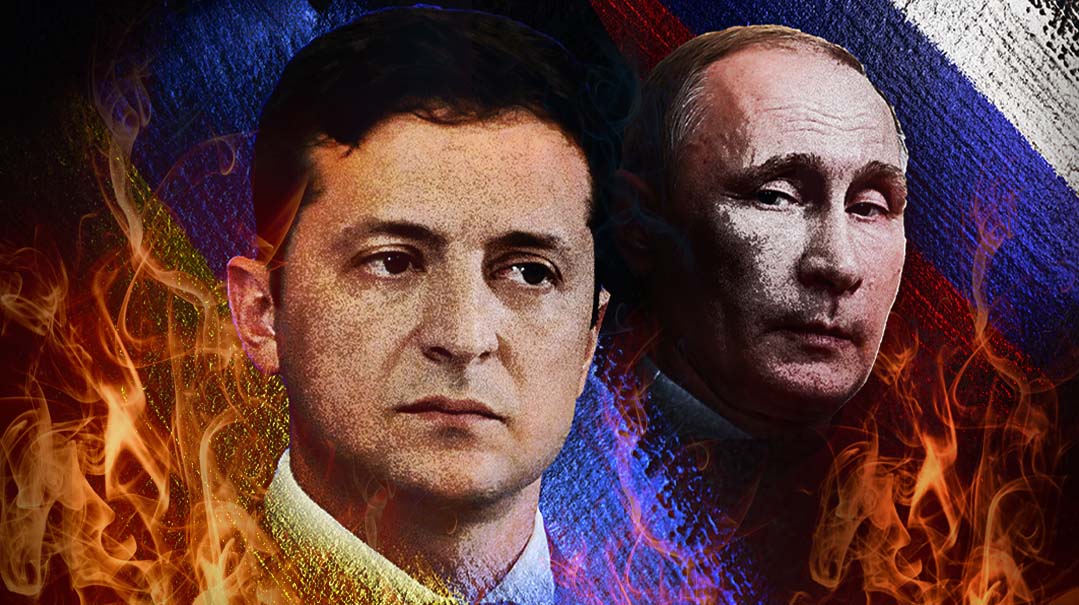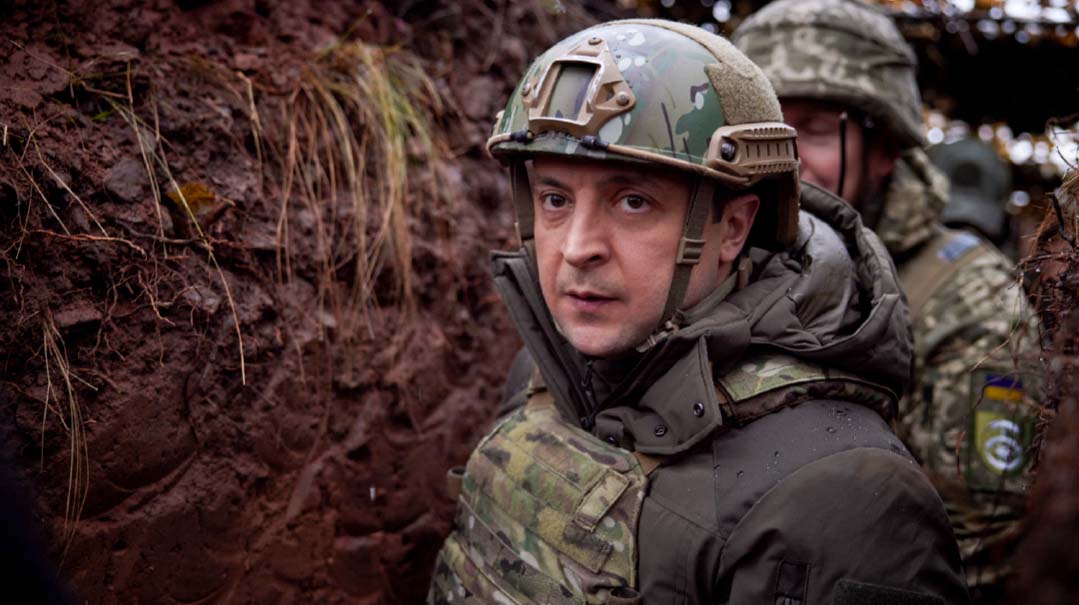The Comedian Who Wouldn’t Crack
| March 1, 2022"I was as surprised as anyone that the entertainer-turned-president has proven himself to be a national hero under fire"

By Vladislav Davidzon , Ukraine
That Ukrainian president Volodymyr Zelensky would emerge as a wartime hero who chose to stay in Kyiv and rally the troops as the capital was being bombed by the Russian Air Force was nobody’s guess. The Jewish former actor and comedian is an unlikely candidate to be playing the role of Churchill for our times — which just goes to show that sometimes history possesses an ironic sense of humor.
Zelensky was born in Kryvyi Rih, a Russian-speaking region in southeastern Ukraine, to assimilated Jewish parents. He initially earned a law degree from the Kyiv National Economic University, but then switched gears an found his creative niche in acting and comedy.
The production company he created produces films, cartoons, and TV shows — including the widely popular Servant of the People, in which Zelensky had the starring role as an ordinary man who accidentally becomes president of Ukraine. The series, which aired from 2015 to 2019, was a self-fulfilling prophecy. He created a political party with the same name as the show, and won a landslide victory in 2019.
Now the former actor has parlayed his television role in Servant of the People into real power, and has proven himself as a national hero.
In the early hours of February 26, during the initial ferocious assault by Russian troops on the capital of Kyiv, the US government urged Zelensky and his family to evacuate to a safer location, and promised to assist him in such an effort. Zelensky turned down the offer and opted to remain in Kyiv with his defense forces, making the now-famous remark, “I need ammunition, not a ride.”
Zelensky has proven himself to be a national hero under fire, although the physical and moral bravery he’s exhibited were not what Ukrainians would have predicted of him. While there were rumblings of dissatisfaction with his leadership in recent months, he has recaptured almost universal respect in the way he’s rallied the Ukrainian troops and the general population by personal example these last few days.
I’m writing these words from a hotel bunker outside Kyiv where I’m spending this war. Somehow, I’ve managed to keep writing through the air raid sirens going on and off the whole night. By sheer happenstance, the woman sitting next to me in this basement also hails from Kryvyi Rih, the hometown of the 44-year-old president.
“I was never a big fan of his politics,” she says of Zelensky, “but the way he’s behaved over the last few days has been impeccable and very, very brave.”
Although maybe it’s not so surprising after all. Zelensky was elected president because of his popular touch and deep sense of what the average Ukrainian was thinking. He had named his political party after the show in order to signal to the electorate that he’d be different from the usual cast of professional Ukrainian politicians. He may not have been most effective at mastering the minutiae of governing, but when Putin made his move, he was the right man in the right place to rally the Ukrainian everyman against the Russian bear.
When Volodymyr Zelensky was elected with a landslide 73 percent of the vote in the second round of the 2019 election, it was partly as a repudiation of President Petro Poroshenko, but also partly because Ukrainian voters seem to be continually unhappy and like to change leaders at every chance. The choice of Zelensky — an outsider to the political establishment with zero experience in government — was very much a gamble for the Ukrainians who voted for him, but the results seem to indicate a certain collective wisdom in the electorate’s reading of his personal character.
I accompanied Zelensky extensively on the campaign trail, and I never saw him position himself as a member of any cultural elite. He was a cross between Hollywood and Boris Johnson, with a bit of the Trump mystique thrown in — except that Zelensky is much less divisive. He was a charismatic and aggressive campaigner, a person who’s not afraid to look you in the eye and try to figure out what you’re thinking.
Zelensky is actually more comfortable speaking Russian than Ukrainian, and at a private dinner, he once said to me, “I will not be afraid to look Putin in the eye — I’m not afraid to negotiate with him.” Zelensky is not one to give up, and is not interested in making forced concessions.
In my own conversations with him, I’ve actually found him to be pretty quiet, more of a listener than a talker. He prefers to say little, keeping his cards close to his chest while focusing intently on those around him. Like any great stand-up comic, he reads the room and pivots to the crowd.
As extraordinary as Zelensky’s story is, his background is quite ordinary. His was a typical assimilated middle-class Soviet Jewish family — his father a cybernetics professor and his mother an engineer. Zelensky was a teenager when the Soviet Union dissolved, and he grew up in the very tough industrial town of Kryvyi Rih in the Russophone Dnipropetrovsk region of southeastern Ukraine — not an easy place for a scrawny Jewish kid in the early ’90s. Eventually he became an avid weightlifter.
“Can you imagine what it was like being a Jewish kid from that town in the harsh ’90s?” a Ukrainian Jewish businessman told me this morning. “That’s why he’s tough enough to stand up to Putin now.”
Zelensky studied for a law degree, but from the accounts I’ve been privy to over the years, he didn’t take his studies very seriously. Instead, he concentrated on his burgeoning career in show business. Along with some close childhood friends, he founded his production company, Kvartal 95, which produced his flagship series. Zelensky announced his candidacy during a televised New Year’s Eve address, and five months later, he would become the commander in chief of the Ukrainian armed forces.
In the television show, Zelensky played a neophyte president battling corruption and an entrenched oligarchy, while representing the ordinary, hardworking Ukrainian everyman. Where reality began and the show ended was hard for people to parse — especially as Zelensky would eventually demonstrate that he indeed possessed the character traits that he portrayed on the screen.
His critics both marveled and fumed as the show essentially functioned as a prime-time advertisement for Zelensky’s eventual presidential campaign. Watching the production credits roll off at the end is like looking at a roster of the current Ukrainian government. Zelensky is fundamentally distrustful of people he hasn’t known for a long time, and so he packed his cabinet and administration with childhood friends and television associates. Former entertainment lawyers and producers now run the intelligence services and the presidential administration. If his government has a taste for spectacle and understands the profound messages of pageantry and symbolism, it’s probably because it’s staffed by people who cut their teeth in show business.
Though he had worked in Russia, where he had a serious following and where his company made a lot of money, Zelensky had never studied or spent long periods of time in the West, and had to work hard to improve his Ukrainian and English once he was elected. And while he is not deeply educated in political theory or philosophy, he is a moderate liberal by instinct and temperament.
The learning curve for Zelensky as president has been steep. He was roundly criticized for the way his government handled the Covid epidemic. He sacked his first cabinet in March 2020 over plummeting approval ratings, his government has been accused of being arrogant and unresponsive to criticism, and some of his most strident opponents speculated that he was some sort of Russian sleeper agent.
Zelensky dealt as elegantly as could be expected under the circumstances when President Trump tried to coerce him into investigating the business activities of Joe Biden’s troubled son Hunter in Ukraine, a crisis that he’d inherited from the previous president. In retrospect, the Ukrainians seem to have gotten out of that situation by sheer luck.
Zelensky, for his part, is deeply cognizant of the fact that his Jewish background — regardless of his very limited exposure to traditional culture or education — was an issue to be reckoned with during the election campaign. There were some anxious moments for local Jewish elites, who speculated that a potential failure could bring about an escalation in anti-Semitic sentiments.
Zelensky didn’t seem particularly interested in discussing his Jewish identity when my friend French philosopher Bernard-Henri Lévy and I met with him over a dinner in the Ukrainian capital the night before he won the presidency in 2019. Still, he mentioned that his grandfather lost most of his family in the Holocaust, a point he repeated in many of his speeches, including one in Jerusalem during a Holocaust commemoration ceremony a year after coming to power.

In the trenches with his soldiers. “I need ammunition, not a ride”
That Ukraine is being led by a Jewish commander in chief in this war is in many ways a surreal development, but not altogether surprising to those who understand the region’s delicate multicultural balance. As Ukraine’s Rabbi Yaakov Dov Bleich tweeted last week as the Russian Air Force bombed Kyiv, “The Jewish community is an integral part of Ukraine and stands with the Ukrainian people, government, and armed forces in defending Ukraine. The government of Ukraine has stood by the Jewish community since Ukraine became independent in 1991.”
Whatever happens now, Zelensky knows he didn’t run away or hide, and his grace under fire has captured the world’s admiration and respect. That poise is doubtless a major reason that the Ukrainian army did not fold in the first four days of a war against an enemy that’s massively better armed and equipped and that possesses near total air superiority.
Zelensky has not fled and has not blanched. He’s appeared on Ukrainian television sharing tea and solidarity with his soldiers, while Russian president Vladimir Putin sits in a safe bunker far away from the men he’s dispatched to destroy a peaceful population.
When Zelensky’s moment came to play the role of a lifetime, the comic actor didn’t flinch. He embraced the role — and became, in turn, an authentic and very serious statesman.
Vladislav Davidzon, author of From Odessa with Love, is a Russian-American writer, editor, and journalist who has been covering post-Soviet Ukraine for the past ten years.
(Originally featured in Mishpacha, Issue 901)
Oops! We could not locate your form.






